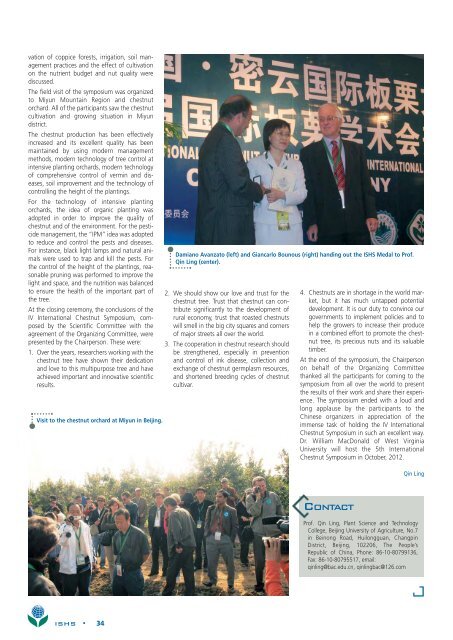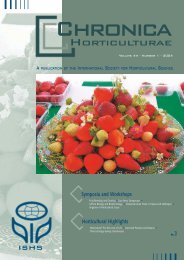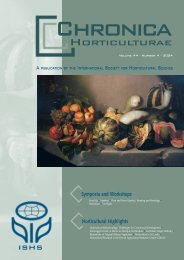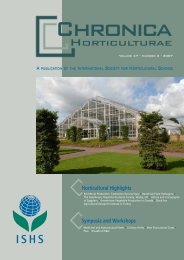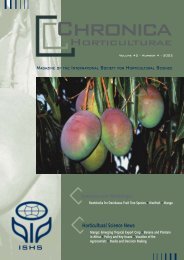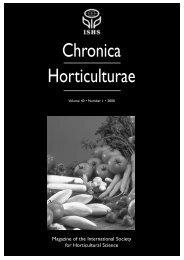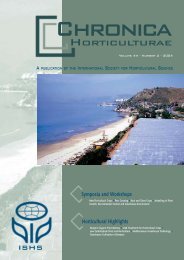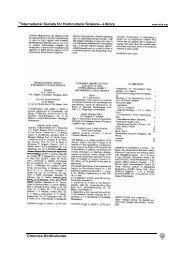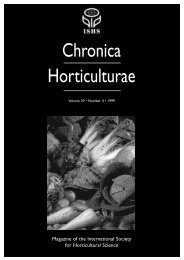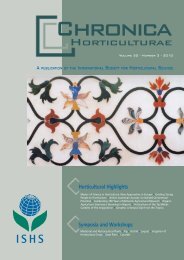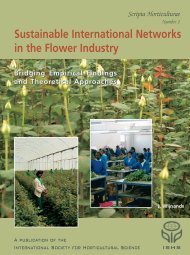Chronica Horticulturae volume 49 number 2 ... - Acta Horticulturae
Chronica Horticulturae volume 49 number 2 ... - Acta Horticulturae
Chronica Horticulturae volume 49 number 2 ... - Acta Horticulturae
Create successful ePaper yourself
Turn your PDF publications into a flip-book with our unique Google optimized e-Paper software.
vation of coppice forests, irrigation, soil management<br />
practices and the effect of cultivation<br />
on the nutrient budget and nut quality were<br />
discussed.<br />
The field visit of the symposium was organized<br />
to Miyun Mountain Region and chestnut<br />
orchard. All of the participants saw the chestnut<br />
cultivation and growing situation in Miyun<br />
district.<br />
The chestnut production has been effectively<br />
increased and its excellent quality has been<br />
maintained by using modern management<br />
methods, modern technology of tree control at<br />
intensive planting orchards, modern technology<br />
of comprehensive control of vermin and diseases,<br />
soil improvement and the technology of<br />
controlling the height of the plantings.<br />
For the technology of intensive planting<br />
orchards, the idea of organic planting was<br />
adopted in order to improve the quality of<br />
chestnut and of the environment. For the pesticide<br />
management, the “IPM” idea was adopted<br />
to reduce and control the pests and diseases.<br />
For instance, black light lamps and natural animals<br />
were used to trap and kill the pests. For<br />
the control of the height of the plantings, reasonable<br />
pruning was performed to improve the<br />
light and space, and the nutrition was balanced<br />
to ensure the health of the important part of<br />
the tree.<br />
At the closing ceremony, the conclusions of the<br />
IV International Chestnut Symposium, composed<br />
by the Scientific Committee with the<br />
agreement of the Organizing Committee, were<br />
presented by the Chairperson. These were:<br />
1. Over the years, researchers working with the<br />
chestnut tree have shown their dedication<br />
and love to this multipurpose tree and have<br />
achieved important and innovative scientific<br />
results.<br />
Visit to the chestnut orchard at Miyun in Beijing.<br />
Damiano Avanzato (left) and Giancarlo Bounous (right) handing out the ISHS Medal to Prof.<br />
Qin Ling (center).<br />
2. We should show our love and trust for the<br />
chestnut tree. Trust that chestnut can contribute<br />
significantly to the development of<br />
rural economy, trust that roasted chestnuts<br />
will smell in the big city squares and corners<br />
of major streets all over the world.<br />
3. The cooperation in chestnut research should<br />
be strengthened, especially in prevention<br />
and control of ink disease, collection and<br />
exchange of chestnut germplasm resources,<br />
and shortened breeding cycles of chestnut<br />
cultivar.<br />
4. Chestnuts are in shortage in the world market,<br />
but it has much untapped potential<br />
development. It is our duty to convince our<br />
governments to implement policies and to<br />
help the growers to increase their produce<br />
in a combined effort to promote the chestnut<br />
tree, its precious nuts and its valuable<br />
timber.<br />
At the end of the symposium, the Chairperson<br />
on behalf of the Organizing Committee<br />
thanked all the participants for coming to the<br />
symposium from all over the world to present<br />
the results of their work and share their experience.<br />
The symposium ended with a loud and<br />
long applause by the participants to the<br />
Chinese organizers in appreciation of the<br />
immense task of holding the IV International<br />
Chestnut Symposium in such an excellent way.<br />
Dr. William MacDonald of West Virginia<br />
University will host the 5th International<br />
Chestnut Symposium in October, 2012.<br />
Qin Ling<br />
CONTACT<br />
Prof. Qin Ling, Plant Science and Technology<br />
College, Beijing University of Agriculture, No.7<br />
in Beinong Road, Huilongguan, Changpin<br />
District, Beijing, 102206, The People’s<br />
Republic of China, Phone: 86-10-80799136,<br />
Fax: 86-10-80795517, email:<br />
qinling@bac.edu.cn, qinlingbac@126.com<br />
ISHS • 34


